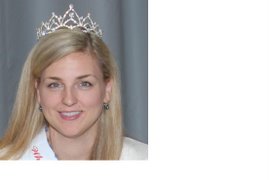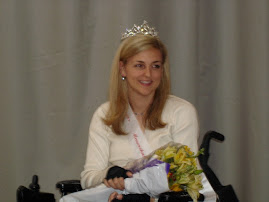Ms. Wheelchair America 2008 Shares Message of Empowerment and Hope
By Faiza Elmasry
Voice of America News
Washington, DC
07 August 2007
Most pageants — like Miss USA or Miss America — are primarily about beauty, popularity or talent. But there is a pageant that is all about raising awareness of the achievements of the disabled and reducing the architectural and attitudinal barriers that still impede their quality of life: the Ms. Wheelchair America Pageant.
"This is not a beauty contest," says pageant judge Matt Kelly.
"I've judged beauty pageants before as part of the Miss USA program, where we were looking more at someone's physical beauty," he explains. "But this contest is really based on three things: their accomplishments, their communication skills and their self perceptions."
Kelly says the woman who took home the crown this year scored high on all three criteria.
Alana Wallace, 56, an educational consultant and mother of four adult children, has had post polio since the age of 5. She has been a life-long advocate for people with disabilities.
Wallace is the founder and artistic director of Dance Detour, Chicago's first professional physically integrated dance company. She is also a founding member of Bodies of Work, a disability arts and cultural festival.
"I just want people to know that people with disabilities are productive, talented and capable citizens and that we have so much to offer," Wallace says.
During her yearlong reign, Wallace will tour the country, advocating for fully accessible housing for the disabled.
She says that means more than just widening doorways or eliminating steps. "Many times we purchase condos or move into new homes and we find that while there are maybe turning areas, we can't reach our cabinets. A lot of our appliances are not accessible," she notes. "I support the universal design, which means that the home is going to be useable by anyone."
Although Alana Wallace wore the crown, other pageant contestants say they feel like winners as well.
Ms. Wheelchair Arkansas, Jennifer Briggers, 23, says the event was an opportunity for her to make friends and share her life experiences. "What I'm trying to share is that I've been independent and becoming more and more successful every day, even though I do have a disability," she says.
Briggers is working on her doctorate in psychology. Her mother, Delois Kitchens, who accompanied her to the pageant, says her daughter has always focused on her capabilities and lived her life on her own.
"I had another child, and I didn't treat her differently," she says. "He got a spanking, she got one when she was bad. We treated them the same. She never grew up feeling she was handicapped, I guess."
The annual Ms. Wheelchair America competition has always showcased the abilities, determination and courage of women in wheelchairs, according to contest president Robert Watson.
"They are awesome," he says. "Some have several degrees. Some have PhDs. Some people have come from acquired disability to this point, where they accepted their disability. They are just accomplished women."
Business consultant and author Judy Hoit was Ms. Wheelchair Iowa in 1996 and is still active in the program. She says it has helped raise public awareness of the abilities and needs of the disabled community. She says this year's competition is significant.
"We are celebrating the fact that we've been around for 35 years," she says. "One of the biggest things is the education part of it because every time a person makes an appearance and meets people and tells them maybe transportation situations, employment challenges they have had in a wheelchair, every time they tell their stories or talk to a group, it's always an eye opener. People go, 'Oh, I never thought about that.'"
Autumn Grant says she got that reaction a lot over the past year, as Ms. Wheelchair America 2007. Grant says that although each Ms. Wheelchair chooses her own issue to highlight during her reign, the message is the same.
"I think mainly acceptance, for people to look at people with disabilities and realize although they have differing abilities, they are still people, and you can identify with on so many different levels," she says. "That's something we still need to work on both here and abroad, because there is still so much stigma attached to the disability. We need to get passed that."
Ms. Wheelchair America 2008, Alana Wallace, says she is excited about her new role as a national spokeswoman for the disabled community. She's looking forward to traveling, meeting the public, and speaking out — an example of what women in wheelchairs can achieve.
skip to main |
skip to sidebar

Ms. Wheelchair Massachusetts 2007, 2nd Runner Up Ms. Wheelchair America 2008

Ms. Wheelchair Massachusetts 2007, Crowning Ceremony

Ms. Wheelchair America 2008, Crowning Ceremony, Placed Second Runner Up

UPDATED DAILY!!!
Kristen McCosh

Ms. Wheelchair Massachusetts 2007, 2nd Runner Up Ms. Wheelchair America 2008
Official Bio for Press Releases
- Kristen McCosh, "Leading By Example"
- Boston, MA, United States
- Kristen was chosen as Ms. Wheelchair Massachusetts 2007. A gifted speaker and writer, she is currently finishing a Women's Fiction novel series featuring women with disabilities as heroines. She graduated Magna Cum Laude with a BA in English and Political Science from the University of Massachusetts at Boston, and has studied toward her MPH at Boston University School of Public Health. Kristen is employed as the Editor In Chief of "Solutions" e-magazine, published by Hire Disability Solutions, LLC - www.hireds.com. She also works as an Early Intervention Program Consultant with newly-injured SCI patients at Spaulding Rehab Hospital. Kristen sustained a C6 spinal cord injury (SCI) in a diving accident at the age of 15. She lives in Boston and Falmouth, Cape Cod, with her husband.
Official Quote for Press Releases
"We are the first generation of Americans with disabilities to be recognized as having equal civil rights under the law, and because of this we bear a responsibility; that is, not only to break down barriers for others, but also to lead by example."
Official Contact Information
Kristen is available for events, interviews, and appearances. She always welcomes greetings from her readers. Feel free to contact her. Her contact Email Address is: mswheelchairmass07@yahoo.com. Her Mailing Address is: Kristen McCosh, PO Box E28, South Boston, MA 02127. Her Cell Phone Is: 617-312-5804. Her Website is: http://www.mswheelchairmass.org/.
Official MWMA Photo for PR

Ms. Wheelchair Massachusetts 2007, Crowning Ceremony
The Ms. Wheelchair Massachusetts Organization
This 501 (c) (3) non-profit organization seeks to give women with disabilities a forum to promote their achievements as well as an opportunity to voice the needs of those with mobility impairments. It is in no way a beauty contest; rather, it is an annual competion to select the most accomplished and articulate spokesperson for people with disabilities in the Commonwealth. By her example, the winner will showcase the talents, abilities and value of disabled women. She will work to inspire others with disabilities while advocating on their behalf to the business, political, and non-disabled community.
Show your Support - Donate to the Ms. Wheelchair Massachuetts Organization
In order to ensure successful continuation of the program, the Ms. Wheelchair Massachusetts Organization needs your financial support. We are actively seeking corporate sponsors, as well as donations from individuals and groups. Contributions are tax-deductible, and will be used to establish a successful state program that will lead to strong representation each year in the national competition. All donations can be made out and mailed to Ms. Wheelchair Massachusetts at the address above. Every sponsor and donor will be highlighted on my blog. Thank you in advance...
Photography Fundraising Update
Kristen's husband is donating sales from his photography business to support the Ms Wheelchair Massachusetts program. Please visit his website to browse and purchase photos: http://www.johnmccoshphotography.com/
Total Funds Raised To-Date: $135
Total Funds Raised To-Date: $135
Official MWA Photo for PR

Ms. Wheelchair America 2008, Crowning Ceremony, Placed Second Runner Up
Sponsors for the 2008 Ms. Wheelchair America Pageant
- * * * * * * * * * * * * * * * * * * * * * * * *
- Aunt Joan
- NEMED
- George & Margaret McCosh
- Ann Magner
- Families of Special Olympians
- Allcare Medical Supply
- Anonymous Friend
My Email Buddies
- EMAIL ME TODAY AND GET YOUR NAME PLACED HERE ON MY BUDDY LIST!!! mswheelchairmass07@yahoo.com
- * * * * * * * * * * * * * * * * * * * * * * * * * * * *
- Lorraine C
- Tracey K
- Jim
- Buddy
- Janet
- Sarah Mac
- DD
- Sigrid
- John
- LU
- Cookie
- Sebouh
Labels
- Access (2)
- Advocacy (47)
- Consumer Education (16)
- E-Magazines (1)
- Employment (6)
- Events Attended (15)
- Fundraiser (5)
- FYI (32)
- Health Insurance (1)
- Inspirational Thoughts (23)
- Legislation (7)
- Ms Wheelchair America (26)
- Official Appearances (25)
- Opinions (7)
- Organizations (63)
- Physical Fitness (22)
- Press Release (21)
- Profiles (25)
- Rehabilitation (1)
- Research (6)
- Solutions Magazine (2)
- Spinal Cord Injury (40)
- Sponsors (9)
- Support (2)
- Transportation (1)
- Universal Design (2)
- Upcoming Appearances (25)
- Upcoming Event (37)
- Veterans (2)
- Volunteer Opportunity (2)
- Women's Disability Issues (2)
- Writing (6)
My Year As Ms Wheelchair Massachusetts 2007 In Pictures
Check Out My Webcasts at EndeavorFreedom.tv
Check Out My Calendar of Upcoming Events!
Check Out Some Of My Favorite Links!
- The Miami Project
- Care Cure Community
- Endeavor Freedom TV
- Ms Wheelchair America
- Hire Disability Solutions
- National Council On Disability
- New Mobility Magazine
- John McCosh Photography
- Ms Wheelchair Massachusetts
- Boston Center for Independent Living
- Christopher and Dana Reeve Foundation
- National Spinal Cord Injury Association
- Christopher Reeve Paralysis Resource Center
- Greater Boston Chapter of National SCI Association
- American Association for People with Disabilities
- Boston Medical Center - Stepping Forward, Staying Informed
